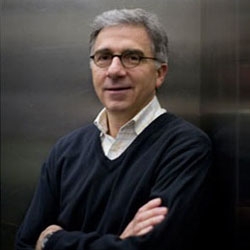 Doug Melton, co-founding director of the Harvard Stem Cell Institute (HSCI), a leading stem cell and regenerative biologist, and one of the driving forces behind Harvard's ascendency to world leadership in the field, has been named a University Professor, Harvard's highest professorial distinction.
Doug Melton, co-founding director of the Harvard Stem Cell Institute (HSCI), a leading stem cell and regenerative biologist, and one of the driving forces behind Harvard's ascendency to world leadership in the field, has been named a University Professor, Harvard's highest professorial distinction.
The Thomas Dudley Cabot Professor of the Natural Sciences, a Harvard College Professor, and with his wife, Gail, the Co-Master of Eliot House, Melton, is also Co-Chair with David Scadden - HSCI's co-founding director - of the University's Department of Stem Cell & Regenerative Biology - the first academic department based in two schools.
"While the world knows Doug Melton as a scientist who has played a seminal role in the exponential growth of the new field of stem cell science, we at Harvard also know him as an untiring mentor to scientific leaders of tomorrow, and as an academic who is passionate about improving undergraduate education," Faust said.
The University Professorships were established by the President and Fellows of Harvard College in 1935 as a special way to recognize "individuals of distinction…working on the frontiers of knowledge, and in such a way as to cross the conventional boundaries of the specialties."
"I really don't know how to properly express my gratitude to President Faust for this honor," Melton said of his assuming the Xander University Professorship. "But far, far more important than any honor I am being granted is the unstinting support that President Faust, the University, and my colleagues have provided for our efforts to establish Harvard as a global leader in stem cell science and regenerative biology. They have stayed the course in the face of intense political opposition and fiscal difficulties, and without their faith in the science we would never be where we are today."
Melton, who initially made a name for himself by transforming the field of developmental biology in frogs by bringing to bear the new tools of molecular biology, switched to the infant field of stem cell biology and regenerative medicine when his then-six month-old son, Sam - now a junior in Harvard College - was diagnosed with Type I diabetes. Melton has dedicated his career since that time to using stem cell biology to understand and eventually find a cure for diabetes, which was also diagnosed in his daughter, Emma, a recent graduate of the College.
If he has done nothing else in his 30 years at Harvard, Melton, who began his career in developmental biology, has quite specifically been "working on the frontiers of knowledge, and in such a way as to cross the conventional boundaries" of science.
In 2004 with David Scadden, Harvard Medical School's Gerald and Darlene Jordan Professor of Medicine, Melton launched the Harvard Stem Cell Institute, which today boasts more than 85 principal investigators, and a total of more than 1000 scientists, from across the science departments, schools, and affiliated hospitals at Harvard. Such a collaborative, interdisciplinary effort would have been literally unthinkable when Melton came to Harvard in 1981, after undergraduate studies at the University of Illinois, and earning at PhD at Cambridge University, in England.
And three years ago, Melton and Scadden were named co-chairs of SCRB, Harvard's first interschool department. Based in both the Faculty of Arts and Sciences, and Harvard Medical School, the department has launched a new undergraduate concentration in regenerative biology, introducing a new generation of students to stem cell science and its possibilities in lab and clinic.
Though a senior scientist directing a large laboratory, department co-chair and co-director of an institute, and beginning his second year as Co-Master of Elliot House, Melton is this semester teaching in three classes, and has long been committed to the teaching of undergraduates. "There are any number of great research institutions with outstanding scientists," he said, "but what makes Harvard truly special is the quality of its students, undergraduates, graduate students and postdoctoral fellows. I especially enjoy teaching undergraduates because of their almost palpable desire not only to learn, but also to expand the frontiers of learning."
In the laboratory, Melton's life is devoted to learning precisely what events in the course of diabetes cause the patient's immune system to turn inward and destroy the insulin producing beta cells in the pancreas. With that knowledge, he believes he and other researchers will have an excellent chance of stopping and reversing that process, thus developing a cure for diabetes.
In the laboratory, Melton's life is devoted to learning how to make pancreatic beta cells, the cells that make insulin. He has recently embarked on a new project aimed at determining what events in the course of diabetes cause the patient's immune system to turn inward and destroy insulin producing beta cells. With that knowledge, he believes he and other researchers will have an excellent chance of stopping and reversing that process, possibly developing a cure for diabetes.
Along the way, Melton and his postdoctoral fellows and graduate students have produced a number of major advances in the field of stem cell science, the most important of which thus far has been first successful effort in the direct reprogramming of adult cells - turning general cells in the pancreas into insulin producing beta cells.
